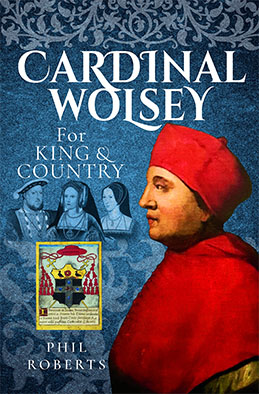- Screen Colours:
- Normal
- Black & Yellow
Book review: Cardinal Wolsey, for King & Country, by Phil Roberts
 Phil Roberts is a Tudor historian, researcher and author, a capable lecturer and popular BBC radio guest. His latest book subtitled ‘for King and Country’ is timely given that we are about to celebrate 550 years since Wolsey’s birth.
Phil Roberts is a Tudor historian, researcher and author, a capable lecturer and popular BBC radio guest. His latest book subtitled ‘for King and Country’ is timely given that we are about to celebrate 550 years since Wolsey’s birth.
Phil’s book is comprehensive, well researched and informative; it adds to the lay readers knowledge of Tudor England. I was particularly interested in the chapter on the building of the Cardinal’s Colleges, the one in Oxford becoming Christchurch after Wolsey’s fall from grace and the one in Ipswich (a school rather than a University College) being dismantled on Henry VIII’s orders after Wolsey died but importantly before any of the new buildings were used.
Wolsey returned to Ipswich in 1517, as a pilgrim, visiting the shrine of Our Lady of Grace which was in the chapel that stood on the corner of St Matthews Street and Lady Lane. Phil speculates that this visit might have inspired Wolsey to create a feeder school to his Oxford College. It was soon after this visit that things started moving and by 1521 a Papal Bull, an edict issued by the Pope, had been dispatched from Rome.
Building colleges, and ensuring they have sufficient income to continue running, isn’t cheap, but Wolsey not only knew this, but also knew of a source of revenue. For his Oxford college he suppressed Saint Frideswide’s Priory, a well-endowed religious house, using the buildings for the educational institution. Similarly in Ipswich he suppressed the Priory of St Peter and St Paul using some of the existing buildings, but he also built new facilities.
One of the most important reasons for taking control of both St Frideswide’s in Oxford and St Peter and St Paul in Ipswich is that they were both well endowed, receiving a substantial income for the land and property they owned, not only in their immediate neighbourhood but further afield across the region. It is this income that would allow these colleges to flourish, and to attract scholars of ability. Selecting the quality of the undergraduates increased the achievements of the alumni, and thus the reputation of the institution.
A decent independent income allows the college to provide accommodation, subsistence and some individual tuition attracting quality individuals, Wolsey knew this because he had been a beneficiary of something similar in his early life. So, who was this man, Wolsey, and how did he achieve the King’s favour? Phil explores not only Wolsey, but also his family, establishing where he came from and how he was able to attend Oxford, clearly the first major step on the route from being a commoner rising into the political world dominated by the aristocracy.
As I’m sure you know, it wasn’t all plain sailing, Henry VIII wanted a divorce from his queen, Katherine of Aragon, so he could marry Anne Boleyn (whom Henry believed would bear him a male heir). Wolsey tried his best – he always did for the King – but divorce was not permitted in the Catholic Church and the Pope was not only reluctant to agree, but equally slow in announcing a decision. Henry became frustrated and accused Wolsey of treason; Wolsey was summoned from York, but died in Leicester on his way to the Tower.
Phil Roberts’ book is full of facts including an interesting section towards the end listing events in chronological order, not only is this useful, it is essential given that these have been a little out of sequence earlier in the volume. However, I would suggest that it is an essential reference for anyone fascinated by Wolsey and an interesting read if you simply want to know more beyond the headline facts.
John Norman